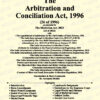THE INDIAN EASEMENTS ACT,1882 BARE ACT ENGLISH EDITION 2025
| Binding | Hardbond |
|---|---|
| Publisher | WHITESMANN PUBLISHING |
| Edition | EDITION 2025 |
| Publishing Year | 2025 |
| Laguage | English |
₹90 Original price was: ₹90.₹72Current price is: ₹72.
₹180 Original price was: ₹180.₹144Current price is: ₹144.


₹80 Original price was: ₹80.₹64Current price is: ₹64.